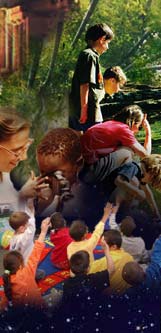 |
 |
PRESS ROOM
| | |

October 17, 1998
French, Swedish, and American Teachers with
"Vision and the Scientific Habit of Mind" attend Socrates
workshop in Alexandria Oct. 23-31, 1998 to prepare for educational
celebration of the city's 250th Anniversary.
Vision and the Scientific Habit of Mind
Dr. Mary L. Radnofsky (president of The Socrates
Institute, a non-profit educational corporation in Alexandria, and
member of the Alexandria-Caen Exchange Committee) will welcome ten
teachers from our sister cities of Caen, France and Helsingborg,
Sweden from October 23-31, 1998. The French and Swedish educators
will join ten teachers from Alexandria's own Patrick Henry Elementary
School and St. Coletta School to attend a 5-day professional development
workshop on interdisciplinary curriculum, in Stage One of a year-long
educational project.
The four stages of Vision and the Scientific Habit of Mind
are: (1) The Socrates Institute teacher workshop on interdisciplinary
curriculum and Internet integration in October 1998, (2) communication
and adaptation of the curriculum between participating educators
from Nov 1998-March 1999, (3) simultaneous, international implementation
of the curriculum in April 1999, and (4) The Socrates Festival presenting
the students' collaborative projects and interdisciplinary mural
at Landmark Mall on June 4-5, 1999, showcasing their work locally
and on the Internet.
The Socrates Institute is enabling these 20 educators to share the
opportunity to customize interdisciplinary programs based on Smithsonian
museum exhibits, in order to integrate traditionally fragmented
school schedules. Linking diverse disciplines through a central
theme helps children better understand and address complex, real-life
problems.
Dr. Radnofsky, designer of the project, says, "Students ---
regardless of their race, gender, creed, national origin, or handicapping
condition --- will actively participate in their own learning as
they investigate the interrelationship of science with other subjects
such as math, art, social studies, music, and language arts. Once
they see how their school subjects are related to each other, via
projects with The Socrates Institute, they begin to think about
the natural links between different aspects of their lives, and
are better able to transfer problem-solving skills from one area
to the next."
The activities and projects related to the current theme, Vision
and the Scientific Habit of Mind, will involve both traditional
learning tools as well as state-of-the-art computer technology and
Internet capabilities.They are all correlated to Virginia's Standards
of Learning, so that the project meets state and local educational
requirements.
In celebration of our 250th Anniversary in 1999, students will design
and paint an interdisciplinary mural, "Alexandria's Lifeline
to the World" at Landmark Mall, depicting the influence of
past local visionaries in the arts, sciences, politics, etc. and
how they have shaped Alexandria's relationship with the rest of
the world. The mural will also reflect the children's visions of
the future of Alexandria at the start of the next millennium.
This international project will connect Alexandria and her sister
cities through their children's discoveries and inventions across
disciplines. It will increase their chances of gaining the kind
of education, both in school and out in the world, that best prepares
them for the global job market in the 21st century.
Other Press Releases:
| May 13, 04 |
Mar, 04 |
Nov 7, 03 |
Apr 21, 00 |
Apr 5, 00 |
| Mar 23, 00 |
Mar 13, 00 |
Mar 8, 00 |
Apr 15, 99 |
Mar 30, 99 |
| Mar 16, 99 |
Mar 6, 99 |
Oct 17,
98 |
Jun 15, 98 |
Jun 3, 98 |

CyberEthics Project
|
 |

